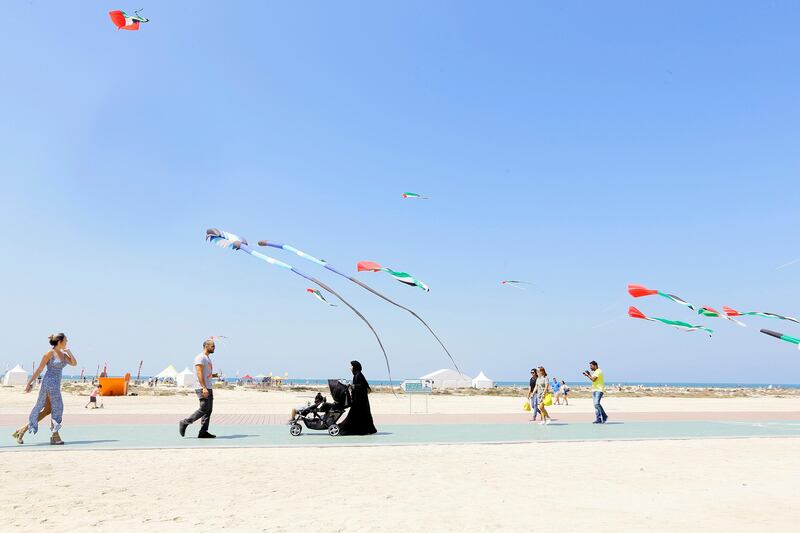The dangers of low levels of vitamin D for women who cover up for cultural and religious reasons are well known.
Sunlight is the best source of vitamin D, which is generated in the skin and vital for helping our bodies to absorb the calcium in our diets that we need for healthy teeth, bones and muscles. Yet despite the excessive amounts of sunlight in the Middle East, the incidence of bone disease in the region among female adults and the children born to them are disproportionately high.
But now a new study in the UK has found that, in addition to potentially exposing many babies to the risk of rickets – a softening and distortion of the bones all but consigned to medical history in the West, but still prevalent in the Middle East – vitamin D deficiency in pregnant women can also have an impact on the social development and motor skills of pre-school age children.
Nutritional and child health experts at the universities of Bristol and Surrey looked at the impact of maternal vitamin D levels in 7,065 pairs of mothers and children. Part of a long-term study tracking the development of more than 13,000 babies born in the southwest of England, it is one of the biggest research projects of its kind ever conducted.
Before this study, published in the British Journal of Nutrition last month, it was already known that a diet during pregnancy of oily fish, which is high in vitamin D, was “positively associated with childhood cognitive outcomes”.
__________________________
READ MORE
[ A look at the many benefits of stair-climbing ]
[ Walking in Abu Dhabi: a matter of life and death? ]
[ Why getting fit is the remedy for your 'summertime divorce' ]
__________________________
Previous studies, however, had attributed the brain-boosting benefits to the omega-3 fatty acids found in the fish. But the new research, triggered by animal experiments that have shown an association between vitamin D deficiency and abnormal brain development in rats, set out to explore the possibility that vitamin D was the magic ingredient.
Only five previous studies have explored this possibility in humans and the results were inconclusive and inconsistent.
The new research focused on mother-child pairs in the Avon Longitudinal Study of Parents and Children, in which the mother had had her vitamin D levels measured during pregnancy and the child had had at least one neuro-developmental outcome assessed between the age of six months and nine years. These outcomes included motor development (the changes in a way a child controls its movements), communication and social skills, behaviour, cognition (the extent to which it understands the world around it) and reading ability.
There was no evidence of a long-term effect on reading skills. But the researchers conclude that children born to mothers deficient in vitamin D during pregnancy – defined by a blood test showing a concentration of less than 50 nanomoles per litre of the pre-hormone Calcifediol, also known as 25(OH)D – are “more likely to have sub-optimal gross-motor skills at 30 months, sub-optimal fine-motor skills at 30 months and sub-optimal social development scores at 42 months” than children born to mothers with sufficient vitamin D levels.
Quite why this is so remains uncertain, but the link is now clear – when the mother-child pairs were divided into three groups, the greatest effects were seen in children of mothers with the lowest levels of vitamin D during pregnancy.
Despite the benefits of oily fish, it is extremely hard to source sufficient vitamin D from diet alone. The conclusion, say the authors of the new research, is that wherever they live, pregnant women should follow the latest advice from the UK’s Scientific Advisory Commission on Nutrition and take a supplement of 10 micrograms (or 400 IU) of vitamin D a day. This advice, says lead author Dr Andrea Darling, a nutritionist at the University of Surrey, applies especially to women who cover their skin for religious or cultural reasons, even if they live in hot countries, such as the UAE.
“There is evidence that skin coverage, which blocks sunlight to the skin, is associated with poorer vitamin D status, and we know that women in the Middle East are at high risk of vitamin D deficiency,” she said. “Extrapolating from our findings, they would theoretically be at risk of developmental consequences of this in their offspring.”
A study carried out in 2014 by nutritionists at Istanbul Medipol University measured vitamin D levels in 100 female students, 40 per cent of whom wore “Muslim-style clothing”, which covered the whole body but left the face and hands exposed. They found low levels of vitamin D in 20 per cent of the uncovered students, but in 55 per cent of those who wore traditional clothing. “Vitamin D levels in young women,” the authors concluded in a paper published in the journal Nutritional Research, “are associated with clothing style, and the age at which a female begins wearing Muslim style clothing is related”.
Middle Eastern men, says Darling, are also at high risk of vitamin D deficiency, "as the issue is not just of skin coverage but also of sun avoidance, due to the extreme heat”. But there is overwhelming evidence that it is women and their offspring who are most at risk.
A major study carried out in Saudi Arabia and published in the journal Archives of Osteoporosis in 2014 looked at 10,700 patients and found more than 83 per cent were deficient in vitamin D. Over a third of women were suffering from severe deficiency, compared with under a quarter of men.
This, concluded the authors from the King Faisal Specialist Hospital and Research Centre in Riyadh, was “a major public health concern and requires a robust health policy”, including preventive screening for vitamin D, especially among young women and children.











